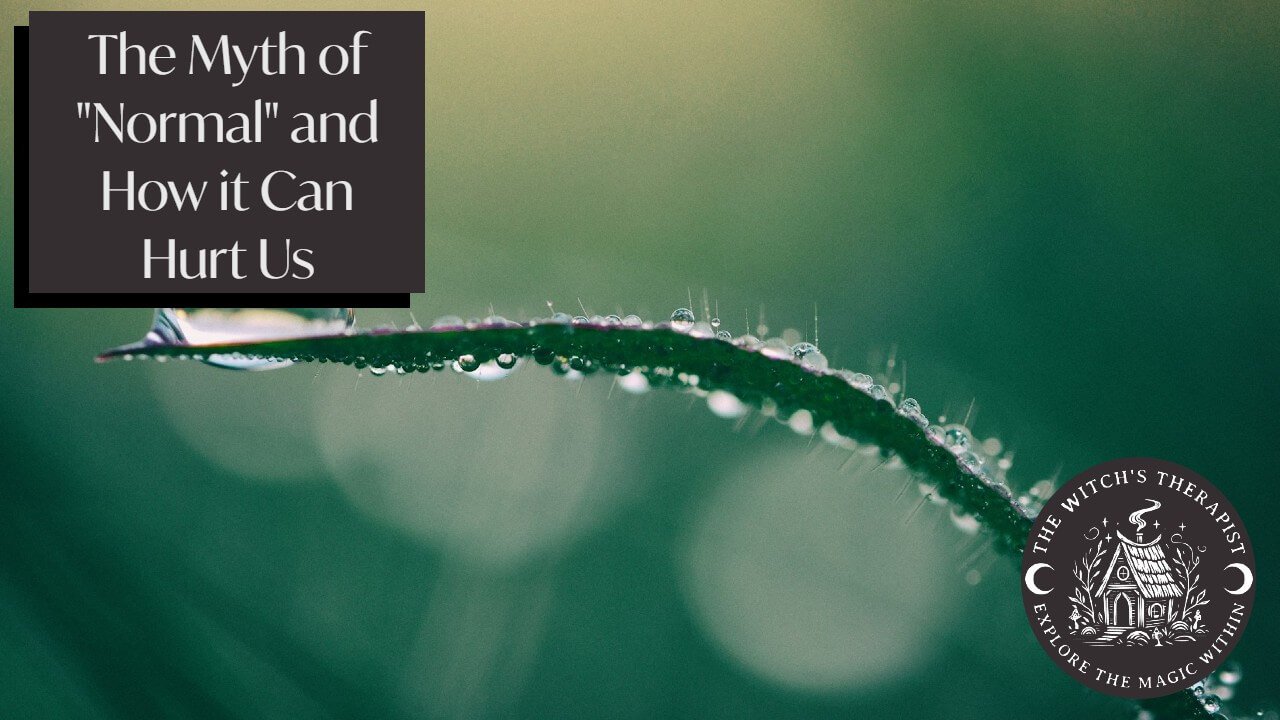The Myth of Normal and How it Can Hurt Us
What does it mean to be normal?
You likely hear it all the time.
It’s a word many people use, without fully understanding its meaning.
It seems harmless enough, but what if there’s more to it?
What if what we accept as normal in our society is actually making many of us unwell?
At our London Ontario psychotherapist clinic, we work to support those who feel unwell.
And we understand that what ails us is a complex interplay of many different factors.
Depression isn’t just about depression.
If it were, you could simply decide to be happy.
Anxiety isn’t just about anxiety.
If it were, you could simply decide to be calm.
You wouldn’t need a depression therapist or an anxiety therapist.
If only it were that simple.
Of course, there’s more to it than that.
It’s about past traumas, defense mechanisms, and so much more.
We’ve talked about normalcy here on The Witch’s Therapist blog before, though indirectly.
Depending on who you ask, you may hear that the excesses of late-stage capitalism is normal, or “human nature”.
But if that were so, why do so many of us struggle with it?
If you’re reading this blog, you probably don’t consider yourself to be normal.
But what you may not realize is how complex normal really is.
In his book The Myth of Normal: Trauma, Illness & Healing in a Toxic Culture, Dr. Gabor Maté invites us to question what we call normal and to see how our world shapes our bodies, minds, and health.
In this article, we’ll explore some key ideas from his work.
It’s an exploration of the idea of normal as much as it is a love letter to Dr. Gabor Maté, whose wonderful work is a goldmine of wisdom.
What Is Normal?
The idea of normal is tricky.
When we say something is normal, we often mean it’s average or usual.
But many things we take for granted as normal are actually unhealthy or harmful under the surface.
In fact, the culture we live in is not normal.
It may be something we’re used to, but that doesn’t mean it’s normal.
In an interview with Democracy Now! Dr. Maté explores this more deeply.
He says, quote:
“What we consider to be normal in this society is actually neither natural nor healthy. In fact, it’s the cause of much human pathology, both mental and physical. Actually, peoples’ pathologies, what we call abnormalities, whether it’s mental or physical illnesses, are actually normal responses to what is an abnormal culture.”
This is something I’ve believed to be true for a long time, but have never before heard it said so beautifully.
In other words, we’re trying to adapt to a culture that is itself toxic.
Modern culture isolates us, makes us afraid, overwhelms us, and traumatizes us.
Is it any wonder so many of us are sick?
How Does Normal Hurt Us?
Over time, stress wears on the body.
That shouldn’t be surprising to anybody.
Often, the advice given to manage things like heart disease is to reduce stress in our lives.
And yes, reducing stress is always a good idea.
But it’s not that simple.
You can’t reduce stress just by telling people to reduce stress.
The approach needs to be holistic.
RELATED: Therapist for Stress in London Ontario
But how can a truly holistic approach to stress management even be possible when the modern world is designed to keep us in a state of intense stress?
We’re under constant pressure to do more, be better, keep up.
Even in our downtime, it can be difficult to feel truly restful.
That’s why so many of us are stressed out, and that stress manifests itself in both mental and physical symptoms.
The trailer for Dr. Maté’s documentary The Wisdom of Trauma begins thusly:
“In the United States, the richest society in history, fully half of the citizens have a chronic disorder such as high blood pressure or diabetes. Anxiety amongst young people is growing rapidly. Asthma and autoimmune diseases are on the rise, as are addictions. Depression is rising, youth suicide is rising... all is not well.”
We live in Canada, of course, not the United States.
But things aren’t that different here.
Allopathic medicine is important, of course.
I’m grateful for the healthcare system we have, as flawed as it is.
But if we ignore the root causes of our illnesses, it’s simply not enough.
And this is normal?
What Can This Tell Us?
There’s a lot more to this, of course.
You could write a whole book on it – like Dr. Maté did.
But what can we learn from the idea that normal is actually a toxic concept?
Let’s take a look.
1. Normal Affects Us, Even If We Don’t Realize
So many of us carry hidden wounds.
From childhood hurts, from losing connection with people, from being told we’re not enough.
These don’t always make us collapse, but they affect our inner lives in a profound way.
This is what Dr. Maté calls a “spectrum of woundedness”, which impacts how we navigate the world around us.
We all carry wounds with us from past hurts.
That manifests differently in each of us, but the pain is there nonetheless.
This, too, is normal.
2. Normalcy Causes Culture-Wide Damage
Capitalism encourages a culture of rugged individualism.
Rugged individualism suggests your problems are your fault, and you have the power to overcome them with enough grit and determination.
On the surface, this may seem almost uplifting, in a way.
But it’s simply not true.
In fact, the very culture in which we live is the cause of many of our problems.
It is true that some of our problems are a result of our own actions.
But far more of them are related to modern culture in general.
In particular, how we organize work, relate to each other, and what we value.
This is a major source of the toxicity that causes so much pain and suffering for so many of us.
For example, our culture prizes productivity over rest.
Competition over caring.
Over time, that shapes us.
It tells us we must push, suppress, hide, and adapt.
And those adaptations, which might help us survive, may damage us in other ways.
But it’s also true that not everyone can adapt to such things.
Walking down the streets of downtown London, one is surrounded by signs of a once thriving community replaced with boarded up doors and windows.
At the same time, we see a growing epidemic of unhoused people, many of whom rely on harmful substances like fentanyl or crystal meth to make it through the day.
While some of us nurse our wounds from late-stage capitalism from the comfort of our homes, there are many who are simply unable to find healthy coping mechanisms.
They’re forced to sleep outdoors, leaning against the plywood that seals off their access to perfectly good, neglected buildings hoarded by a wealthy few.
This is normal?
How We Can Begin to Heal?
I understand that this article may not have been the easiest read so far.
You likely feel a lot of this already, deep down.
But there is hope.
There is always hope.
How can we free ourselves from the toxicity of normal?
Dr. Maté offers a few suggestions
1. Gentle Awareness
Start by noticing, without judgment, how you feel in your body.
Do you feel tension?
Tightness?
Fatigue?
Heaviness?
Just observe.
This is a way to begin listening to your inner world.
What he’s describing here, essentially, is mindfulness.
Mindfulness therapy is geared toward helping us move away from a state of reacting to the world around us.
Instead, it helps us simply experience our feelings.
This can be a useful tool to find relief from anxiety, fear, and stress.
2. Saying What’s True Inside
Often our pain is buried because we were told to do so.
We’re told that when we speak about how we feel, it may upset others.
For some of us, this is overt – we were explicitly told this by an authority figure.
But just in case, there are plenty of subtler messages in our culture.
It’s true that certain things can be difficult for some to handle.
In a polite and kind society, it’s good to do our best to navigate the triggers of those around us.
But that doesn’t mean we should bottle up our emotions.
Your emotions need to be expressed in a healthy way.
Whether it’s journaling, art, meditating, therapy, or beating up on a punching bag, finding safe ways to witness and express what’s inside is a step toward healing.
3. Connection and Belonging
One of the major root causes of why so many people struggle in the modern world is loneliness.
We’re a social species forced into isolation.
But healing happens in concert with your community.
When we feel seen, held, and understood, we can let parts of us soften.
That’s why we’ve created The Witch’s Cottage, a new physical space for community and belonging in the middle of downtown London.
Keep an eye on our socials for upcoming community events.
Because connection heals.
4. Asking New Questions
For many of us, we’ve internalized the idea that we’re not good enough.
That we fall short of expectations, of who we want to be.
This can leave us asking ourselves “what’s wrong with me?”
Instead, consider asking “what happened to me?”
This shift helps opens a more compassionate path.
It helps us see our struggles as responses, not failures.
From there, we can begin to move through them.
5. Slow Unlearning
What we’ve learned to be normal is profoundly unhealthy.
But simply knowing that doesn’t automatically fix everything.
The process of healing may lie in the process of unlearning.
It’s a step-by-step process of getting out of harmful patterns.
Shedding burdens we carried for too long.
Letting ourselves feel things we never allowed.
It’s slow, it’s gentle.
But it’s courageous.
Book Your Appointment With the Witch’s Therapist Today
Navigating normal isn’t easy.
But we’re here to help.
Book your FREE 15-minute intro session with The Witch’s Therapist today.
The Witch's Therapist
609 William St. #101
London, Ontario
Canada
N6B 3G1
1-226-977-1660
► London Ontario Holistic Psychotherapy
The Witch's Therapist is located in London, Ontario and offers holistic psychotherapy therapy throughout London and surrounding areas.
.

